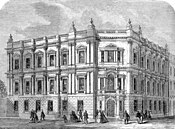St Martin in the Fields (parish)
| St Martin in the Fields | |
|---|---|
| Civil parish | |
 | |
| Area | |
| • 1881/1921 | 286 acres (1.16 km2) |
| Population | |
| • 1881 | 17,508 |
| • 1901 | 12,980 |
| • 1921 | 10,666 |
| History | |
| • Origin | Ancient parish |
| • Abolished | 1922 |
| • Succeeded by | City of Westminster (parish) |
| Status | Civil parish |
| Government | St Martin in the Fields Vestry |
| • HQ | Vestry Hall, St Martin's Place |
| Contained within | |
| • Poor Law Union | Strand (1868–1913) City of Westminster (1913–1922) |
| Today part of | City of Westminster |
St Martin in the Fields was a civil parish in the county of Middlesex, later part of the new County of London, England. It took its name from the Church of St Martin-in-the-Fields and was within the Liberty of Westminster. Within its boundaries were the former extra-parochial areas of Buckingham Palace and St James's Palace.[1]
Geography
[edit]St Martin in the Fields was an ancient parish. In 1542, it gained the "lands between the church of St Clement Danes and the Palace of Westminster" from the parish of Westminster St Margaret.[2]
The parish originally included a number of areas that were carved out between 1645 and 1724 to create new parishes:[3]
| Year | Parish | Localities |
|---|---|---|
| 1645 | St Paul Covent Garden | Covent Garden |
| 1685 | Westminster St James | Piccadilly |
| 1687 | St Anne Soho | Soho |
| 1724 | St George Hanover Square | Belgravia, Mayfair, Pimlico |
The vestry
[edit]In 1855, the parish vestry became a local authority within the area of responsibility of the Metropolitan Board of Works. Under the Metropolis Management Act 1855, any parish that exceeded 2,000 ratepayers was to be divided into wards; as such, the incorporated vestry of St Martin in the Fields was divided into three wards (electing vestrymen): No. 1 (12), No. 2 (12) and No. 3 (12).[4][5] In 1896, as the population of the parish had increased, the incorporated vestry was re-divided into three new wards (electing vestrymen): Park (15), Long Acre (12) and Embankment (9).[6]
Poor law
[edit]St Martin in the Fields was a single parish for the poor law, following the Poor Law Amendment Act of 1834, until 1868, when it became part of the Strand Poor Law Union.
Reform
[edit]In 1889, the parish became part of the new County of London, and in 1900, it became part of the Metropolitan Borough of Westminster. The St Martin in the Fields Vestry was replaced by Westminster City Council, and the vestry hall became Westminster City Hall. The civil parish was abolished in 1922.
References
[edit]- ^ Sir Walter Besant and Geraldine Edith Mitton (1903). The Strand District, The Fascination of London. Adam and Charles Black at Project Gutenberg
- ^ "Estate and Parish History | British History Online".
- ^ Youngs, Frederic (1979). Guide to the Local Administrative Units of England. Vol. I: Southern England. London: Royal Historical Society. ISBN 0-901050-67-9.
- ^ The London Gazette Issue: 21802. 20 October 1855. pp. 3896–3898. Retrieved 9 April 2015.
- ^ "H.M.S.O. Boundary Commission Report 1885 Westminster Map". Vision of Britain. Retrieved 9 April 2015.
- ^ The London Gazette Issue: 26709. 14 February 1896. pp. 860–861. Retrieved 8 April 2015.


